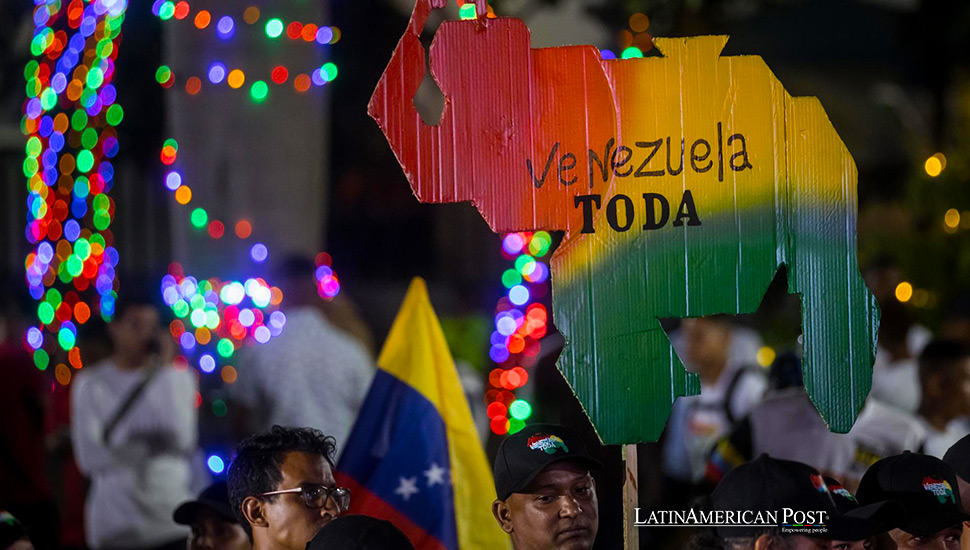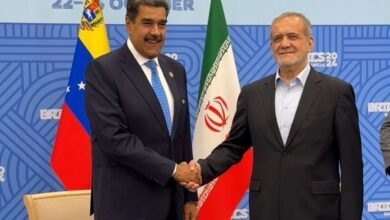Venezuela Escalates Border Dispute, Forms State on Guyanese Land

Amidst geopolitical complexities, Venezuela’s legislative body, aligned with President Nicolas Maduro, ratified the formation of a new state within the contested Esequibo region, escalating a historic conflict with Guyana and challenging international legal norms.
The ongoing territorial dispute between Venezuela and Guyana over the Esequibo region, stretching over 160,000 square kilometers, isn’t just a bilateral issue but a reflection of Latin America’s broader challenges. This situation brings to the forefront the region’s historical legacies, geopolitical dynamics, and the struggle for resource control, all within the framework of international law and regional diplomacy.
Historical Context and Colonial Legacies
Latin America’s map is scarred by borders drawn during colonial times, often ignoring ethnic, cultural, and ecological continuities. The Esequibo dispute, dating back to the 19th century, is rooted in colonial endeavors and the subsequent arbitral award of 1899, which Guyana (then British Guiana) and Venezuela interpret differently. This historical backdrop is crucial for understanding the current tensions and the strong nationalist sentiments in Venezuela, echoed in similar regional disputes, such as the Falklands/Malvinas between Argentina and the UK and Belize’s boundaries with Guatemala.
Geopolitical Dynamics and National Identity
In Venezuela, the Esequibo region has become a symbol of national sovereignty and identity, especially under the leadership of President Nicolas Maduro. This territorial claim intensified amidst Venezuela’s internal crises, serves as a tool for rallying national support and diverting attention from domestic issues. This tactic is not unique to Venezuela; across Latin America, governments have historically used territorial disputes to forge national identity and unity, often at the expense of diplomatic relations and regional stability.
Resource Competition and Environmental Implications
The Esequibo’s rich natural resources, including oil, gold, and biodiversity, add a layer of complexity to the dispute. Venezuela and Guyana see the region as key to their economic development and strategic interests. However, pursuing these resources raises concerns about environmental degradation, indigenous rights, and sustainable development. The situation mirrors the broader Latin American struggle to balance economic growth with environmental protection and social equity, especially in resource-rich but economically struggling nations.
International Law and Diplomatic Challenges
The role of international legal institutions, like the International Court of Justice (ICJ), in resolving such disputes is pivotal yet contested. In this case, Venezuela’s refusal to recognize the ICJ’s authority underscores the challenges facing international law in a region marked by a distrust of colonial legacies and external interventions. The effectiveness of international law in Latin America often hinges on the delicate balance between respecting national sovereignty and upholding international norms and resolutions.
Regional Integration and Solidarity
The Esequibo dispute also tests the strength and unity of Latin American regional organizations. The Union of South American Nations (UNASUR) and the Community of Latin American and Caribbean States (CELAC) have roles in fostering dialogue and mediation. Yet, political divisions could be bettering interests that often hamper their effectiveness. A cohesive regional approach to territorial disputes could promote peace and stability and strengthen Latin America’s collective voice and agency on the global stage.
Societal Impact and Public Opinion
Public opinion in Venezuela and Guyana is significantly shaped by media portrayal and governmental rhetoric concerning the Esequibo dispute. In Venezuela, the issue is often presented as a matter of national pride and historical justice, while in Guyana, it’s viewed as a matter of defending national sovereignty against a larger, more powerful neighbor. The media in both countries play crucial roles in shaping the narrative and influencing public sentiment, which in turn impacts the diplomatic and negotiation processes.
The Role of External Actors
External powers, notably the United States, China, and former colonial powers have varying degrees of interest and influence in the dispute. Their involvement is often viewed through the prism of international geopolitics and resource competition, raising questions about the impact of foreign interests on regional sovereignty and stability. The alignment of Guyana with Western interests and Venezuela’s closer ties with China and Russia add complexity to the dispute, reflecting more significant global geopolitical dynamics.
Looking Forward: Paths to Resolution
Resolving the Esequibo dispute requires nuanced understanding and cooperative efforts considering the historical context, respecting international legal frameworks, and prioritizing sustainable and equitable development. Diplomatic negotiations, supported by regional and international bodies, should aim for a resolution that acknowledges both nations’ legitimate concerns and aspirations while ensuring the protection of the environment and the rights of indigenous and local communities.
Also read: Venezuela’s Precipitous Path to Early Elections with Democracy on the Line
The Esequibo dispute between Venezuela and Guyana is more than a territorial conflict; it’s a microcosm of Latin America’s challenges as it navigates its colonial legacy, geopolitical rivalries, and the quest for sustainable development. Addressing this dispute effectively necessitates a multidimensional approach that balances respect for national sovereignty with adherence to international law and prioritizes the well-being of the region’s people and the environment.




